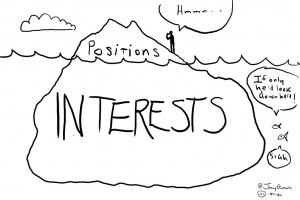How To Save a Negotiation
You’re negotiating.
You’ve prepared, thought about your interests, studied up on the other side, and asked open ended questions to elicit helpful information.
And it is sucking. Hard.
The other side is being jerkish, and every time you try to steer the conversation to problem solving, they drive right back to arguing over details.
You are now trapped in a back and forth about shaving $10 off of your hourly rate because the client didn’t budget that much for your services. You’re now fixed on not losing that $10 an hour.
What do you do, my negotiator; what do you do?
Well, there are lots of perfectly acceptable things you could do.
You could excuse yourself to the bathroom and release the litany of swears you’re keeping bottled up.
You could tell the client that you’re sorry this isn’t going to work out and walk away from the negotiation (fingers crossed that he comes crawling back).
You could try to make up the lost money elsewhere in the contract by incorporating fees for changes and additional time.
Or. You can figure out what you can change to improve the situation.
“But Katie they are being the jerk, not me! Why should I have to change what I’m doing?”
Yes, they are being the jerk, but if you don’t change how you’re approaching this negotiation, it’s going to keep on going the way it’s been going. And you don’t want that. Therefore, you need to change.
Don’t think of changing tactics as some ridiculous admission that you’re wrong. Think of it as being the one who has more skills and is therefore more adaptable when things aren’t working out.
You aren’t giving up. You’re being cunning and trying out one of your other myriad negotiation skills.
Explain Their Interests To Them
Sounds weird, right? I mean, they should know their own interests.
But (1) no one is 100% rational and sometimes we all need help figuring out we’re not acting in our own best interests, and (2) you could be wrong.
When preparing for a negotiation we spend a lot of time trying to figure out what the other side’s interests are. Once we feel fairly comfortable on that front, we don’t often question our assumptions.
So if someone is acting in a way that doesn’t make sense based on what you think their interests are, you need to figure out if you’re right. If you’re right about what their interests are, you can then move on to asking how the heck their current behavior is serving those interests. If you’re wrong, you can get the negotiation back on track.
The easiest way to do this is to tell them what you think they are interested in and ask if you’re right.
Sounds terribly basic, but it works.
“Kip, I’ve been assuming that your primary needs are to find someone who is familiar with the work and can finish the job on your schedule. Is that right?”
“Patrick, my understanding is that your budget is limited and therefore it is driving your decisions about this project. Is that accurate?”
If they say “yes,” move on to explaining how what you’ve been offering is trying to align with their interests. Then ask them why your offers don’t work for them.
If they say “no,” ask them what their interests are.
Either way the negotiation moves beyond impasse and you better understand what they want.
Question Their Standards
“A++ Best Customer Service!!!!1”
“I value independent artists; that’s why I incorporate them into my work and offer fair fees.”
“I want to be known as The Guy to go to in town for this type of work.”
Raise your hand if you’ve heard someone saying something like this while they are behaving exactly the opposite towards you.
Thought so. Hands down.
As Stuart Diamond pointed out the other day on Twitter, the easiest way to deal with folks like this is by asking them questions.
But not any old question. A question that assumes the other side’s purported standards or values and asks that they affirm their belief for you.
The zinger Prof. Diamond suggested : “Is it your goal to make customers happy?”
If they answer “yes” you can explain that you are not happy right now. And they are doing a very good job of making you not happy.
If they say “no” you know that arguing based on this standard isn’t going to help you in the negotiation. And you can follow up with the simple question of “What is your goal?”
So stop beating your head against the wall! Give your forehead a break and make them tell you what they’re actually interested in. Then you can change your approach accordingly and move forward.
Categories: Negotiation Strategy







